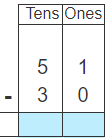
Subtraction Without Regrouping
Concept
Subtraction is the process of taking away a number from another. It is a primary arithmetic operation that is denoted by a subtraction symbol (-) and is the method of calculating the difference between two numbers.
Subtraction without regrouping is also known as subtraction without borrowing. It refers to the cases when the minuend is bigger than the subtrahend.
Rules
1. Place the minuend on top and subtrahend at the bottom so that the place values fall in the same columns.
2. Subtract each column together separately, starting with the one’s place.
3. The differences go below each column, underneath the line.
Example
Subtract.
75 – 21
Solution
Practice Subtraction Without Regrouping

Subtraction – to take away from a group or a number of things.
Minuend – the number from which we subtract
Subtrahend – the number which is subtracted.
Difference – The final result after subtracting the subtrahend from the minuend.
Regrouping is the process of making groups of tens when adding or subtracting two digit numbers (or more) and is another name for carrying and borrowing.
Related Skills
Regroup tens as ones
Subtract 2 digit numbers from 2 digit numbers – with regrouping
Subtraction – check your answer
Estimate difference
Add 2 digits and 1 or 2 digits number – without regrouping
Add a two-digit and a one-digit numbers with regrouping
Add 2 two-digit numbers with regrouping
Estimate sum
Add 3 two-digit numbers







